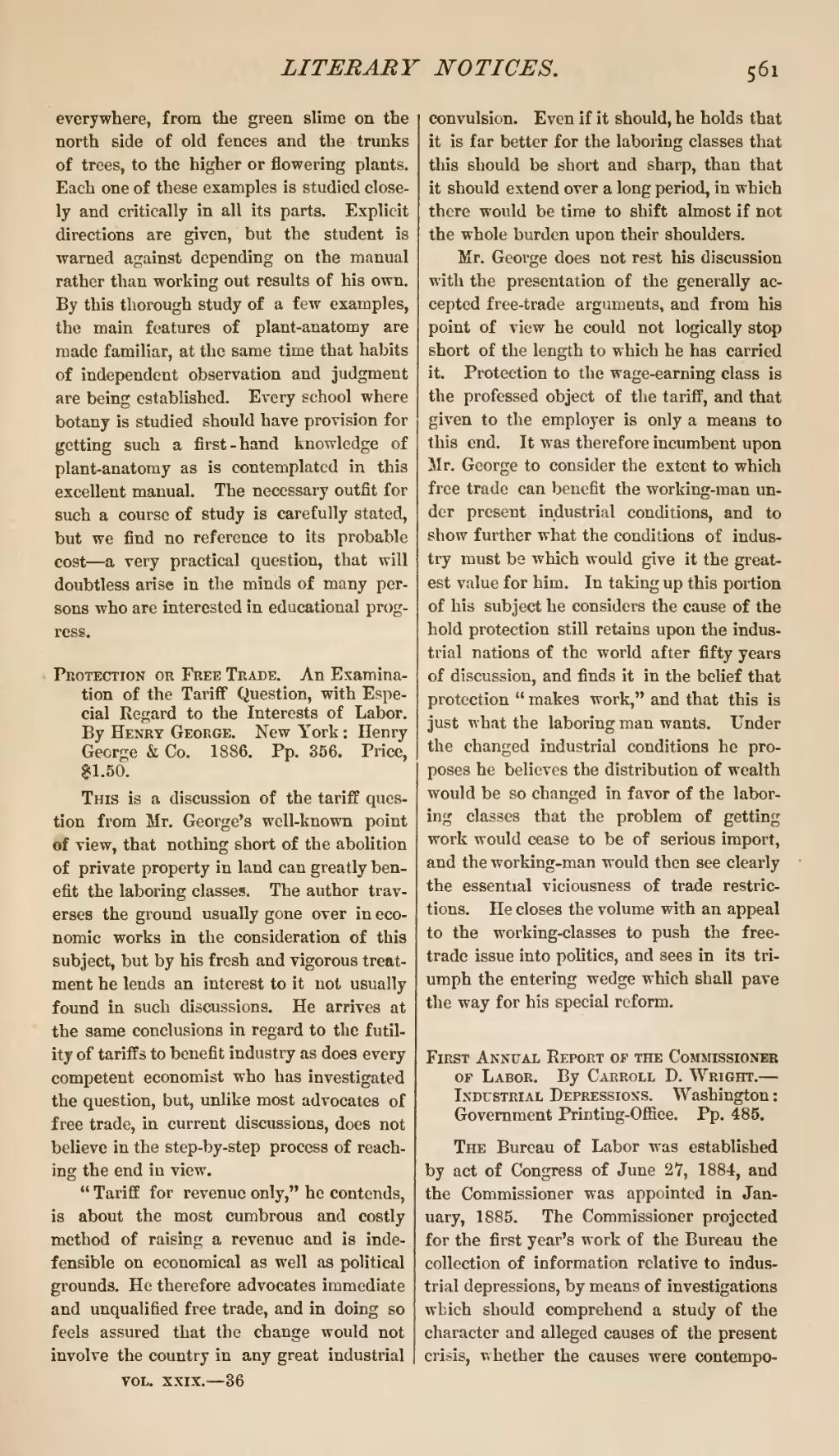everywhere, from the green slime on the north side of old fences and the trunks of trees, to the higher or flowering plants. Each one of these examples is studied closely and critically in all its parts. Explicit directions are given, but the student is warned against depending on the manual rather than working out results of his own. By this thorough study of a few examples, the main features of plant-anatomy are made familiar, at the same time that habits of independent observation and judgment are being established. Every school where botany is studied should have provision for getting such a first-hand knowledge of plant-anatomy as is contemplated in this excellent manual. The necessary outfit for such a course of study is carefully stated, but we find no reference to its probable cost—a very practical question, that will doubtless arise in the minds of many persons who are interested in educational progress.
Protection or Free Trade. An Examination of the Tariff Question, with Especial Regard to the Interests of Labor. By Henry George. New York: Henry George & Co. 1886. Pp. 356. Price, $1.50.
This is a discussion of the tariff question from Mr. George's well-known point of view, that nothing short of the abolition of private property in land can greatly benefit the laboring classes. The author traverses the ground usually gone over in economic works in the consideration of this subject, but by his fresh and vigorous treatment he lends an interest to it not usually found in such discussions. He arrives at the same conclusions in regard to the futility of tariffs to benefit industry as does every competent economist who has investigated the question, but, unlike most advocates of free trade, in current discussions, does not believe in the step-by-step process of reaching the end in view.
"Tariff for revenue only," he contends, is about the most cumbrous and costly method of raising a revenue and is indefensible on economical as well as political grounds. He therefore advocates immediate and unqualified free trade, and in doing so feels assured that the change would not involve the country in any great industrial convulsion. Even if it should, he holds that it is far better for the laboring classes that this should be short and sharp, than that it should extend over a long period, in which there would be time to shift almost if not the whole burden upon their shoulders.
Mr. George does not rest his discussion with the presentation of the generally accepted free-trade arguments, and from his point of view he could not logically stop short of the length to which he has carried it. Protection to the wage-earning class is the professed object of the tariff, and that given to the employer is only a means to this end. It was therefore incumbent upon Mr. George to consider the extent to which free trade can benefit the working-man under present industrial conditions, and to show further what the conditions of industry must be which would give it the greatest value for him. In taking up this portion of his subject he considers the cause of the hold protection still retains upon the industrial nations of the world after fifty years of discussion, and finds it in the belief that protection "makes work," and that this is just what the laboring man wants. Under the changed industrial conditions he proposes he believes the distribution of wealth would be so changed in favor of the laboring classes that the problem of getting work would cease to be of serious import, and the working-man would then see clearly the essential viciousness of trade restrictions. He closes the volume with an appeal to the working-classes to push the free trade issue into politics, and sees in its triumph the entering wedge which shall pave the way for his special reform.
First Annual Report of the Commissioner of Labor. By Carroll D. Wright.—Industrial Depressions. Washington: Government Printing-Office. Pp. 485.
The Bureau of Labor was established by act of Congress of June 27, 1884, and the Commissioner was appointed in January, 1885. The Commissioner projected for the first year's work of the Bureau the collection of information relative to industrial depressions, by means of investigations which should comprehend a study of the character and alleged causes of the present crisis, whether the causes were contempo-

